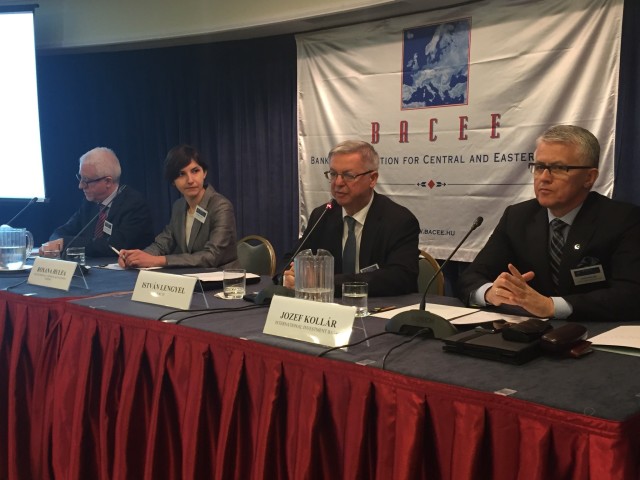IIB gives views on the role of development banks in Central and Eastern Europe at the 32nd BACEE conference

Risks and prospects for the banking sector in Central and Eastern Europe (CEE), including cooperation with multilateral development banks, were the main topic at the 32nd Regional Banking Conference of the Banking Association for Central and Eastern Europe (BACEE). The event took place on April 11-12, 2016 in Budapest, Hungary, with the support of the International Investment Bank (IIB) as its diamond sponsor.
The conference brought together more than 100 financial executives and experts from the UK, Austria, Slovakia, Poland, Serbia, Russia and other countries. Deputy Chairman of the IIB Board (Slovak Republic), Jozef Kollár, and the representatives of the IIB European Regional Office attended the event.
The keynote speech of the conference was delivered by J.Kollar and was focused on the activities of multilateral development banks in the CEE region in the context of a slowing world economy. In particular, Mr Kollar outlined the primary task for the IIB and other international financial institutions today – to take on meaningful risks when they cannot be covered by the state or the commercial institutions, to encourage the private sector to invest, to foster the internationalisation of the region’s SMEs, and to promote international trade, while pooling efforts for the benefit of the region.
According to the IIB Deputy Chairman, the situation in Central and Eastern Europe currently creates a demand for IIB’s services as a development bank even in countries with relatively developed economies. “After its relaunch in 2012, half of all new loan agreements were signed by the IIB with the borrowers from the Czech Republic, Slovakia, Romania and Bulgaria, which now together also account for the largest share in IIB’s paid-in capital (48.7%)”, – stressed J.Kollar. “The role of development banks is exactly to step in when there is a lack of funding from the state or the commercial institutions.”
The participants also discussed the prospects of the global economy and the drivers of economic growth in CEE and CIS countries in the circumstances of a drop in international oil prices, various aspects of investment cooperation in the new environment and other issues important for the banking community.


